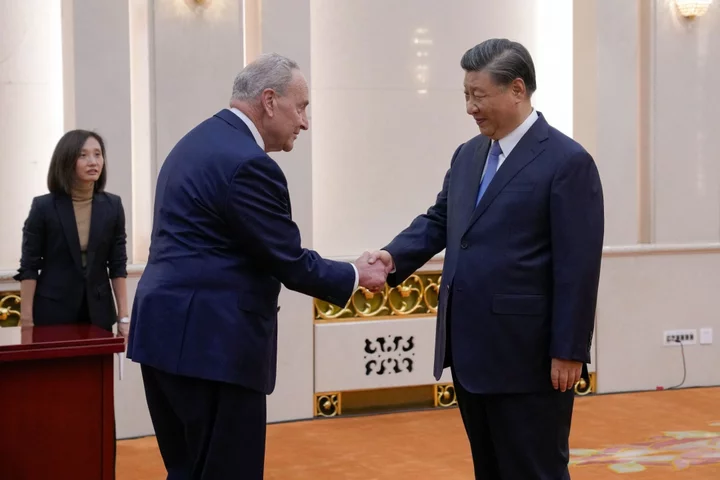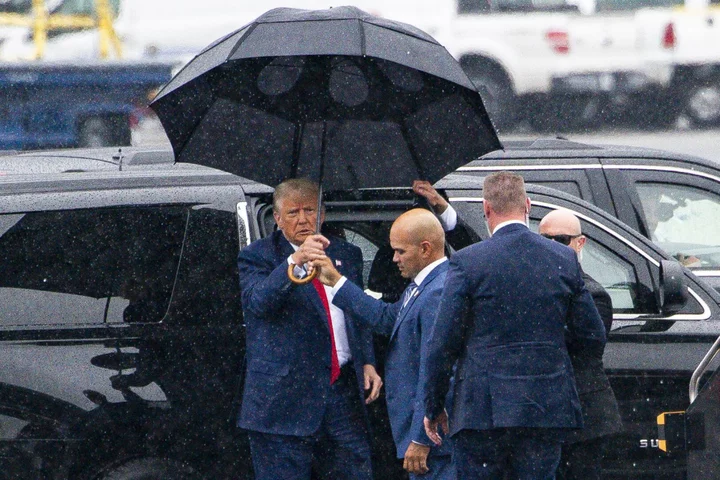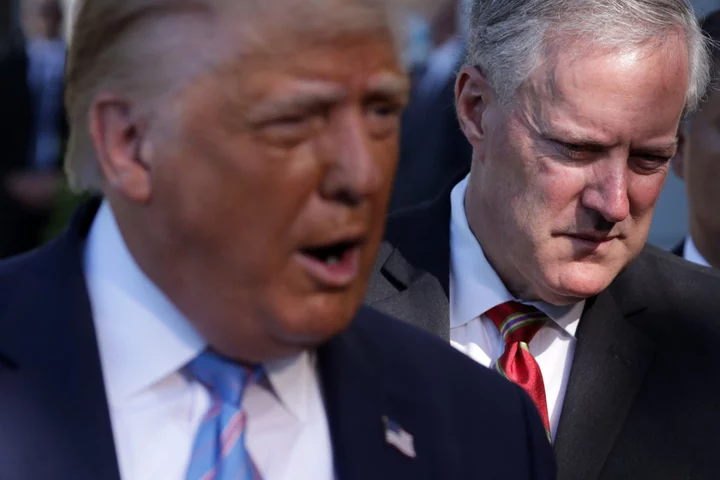Chinese leader Xi Jinping spent the first part of this year seeking to play global peacemaker, proposing a cease-fire in Ukraine and helping long-time rivals Saudi Arabia and Iran reach a diplomatic truce.
Yet his government’s reaction to the Israel-Hamas conflict is exposing the limits of Xi’s ability to bring lasting solutions to some of the world’s most intractable clashes. Much like his proposal on Russia’s war in Ukraine, China’s initial statement on Sunday sought to avoid naming an aggressor and failed to offer any specific offer of immediate assistance.
After Hamas launched a shock incursion into Israel, killing hundreds, China’s Foreign Ministry reiterated a call for an independent Palestinian state while making no mention of the attacks on civilians. “All parties” should act with restraint, according to the two-paragraph statement, which did not mention Hamas by name. The ministry later said it was a “friend to both” sides, and that it was “saddened” by the casualties.
Israel pushed back, with Yuval Waks — deputy chief of the nation’s mission in Beijing — saying China’s failure to condemn the violence as “terrorists are holding children” was regrettable from a country with friendly ties to Israel.
US Senate Majority Leader Chuck Schumer on Monday directly confronted Xi about Beijing’s position, telling the Chinese leader in a rare meeting that he was “disappointed” the Asian nation showed “no sympathy” for the Israeli people. Xi didn’t address those criticisms, only saying publicly during a meeting with Schumer: “We have a thousand reasons to make US-China relations better, and no reason to make them worse.”
The attacks on Israel by the militant group Hamas have handed Xi an “awkward moment,” according to Raffaello Pantucci, a senior fellow at the S. Rajaratnam School of International Studies in Singapore.
“Beijing has moved to paint itself as a global player,” he said. “You would expect them to offer some ideas or thoughts about how to resolve this situation, and yet we do not really see them offering anything.”
Peace player
Xi first waded into the Middle East peace process in March when he took credit for a detente between Iran and Saudi Arabia, after providing the physical site in Beijing for representatives from both sides to talk. That deal came shortly after Xi met with Crown Prince Mohammed bin Salman in Saudi Arabia, and held talks with Iranian leader Ebrahim Raisi.
While there was widespread skepticism the pact would last, and of Beijing’s extent in brokering the deal, its existence put Washington on notice that the Middle East had alternative diplomatic partners.
The Chinese leader followed up that win by hosting Palestinian Authority President Mahmoud Abbas in Beijing in June, saying he was willing to “play an active role” in resolving the conflict. Expectations Xi could play a part in peace talks that have been stalled since 2014 were bolstered by subsequent reports Israeli Prime Minister Benjamin Netanyahu was planning his first trip to China in six years.
Xi’s engagement in the Middle East gave him credibility as a global statesman, as the Chinese leader faced pressure from the US for failing to condemn Russia’s war, and providing Moscow with diplomatic and economic shelter. China’s 12-point position paper on ending the war has been criticized by Ukraine and Western democracies for handing Russia territorial gains.
China’s efforts on Middle East diplomacy worked to “offset pressure on its inaction on Ukraine-Russia,” according to Wen-Ti Sung, a non-resident fellow at the Atlantic Council’s Global China Hub.
Beijing’s recent moves in the Middle East, though limited, also handed Arab Leaders some bargaining power against Washington while giving China a diplomatic boost, Sung said. “But when the chips are down, the Middle East looks to Washington, not Beijing,” he added.
President Joe Biden’s administration has already dispatched the first tranche of a security aid package for Israel, with more assistance to come. Furthermore, the US said Monday it wanted to press ahead with its push to normalize ties between Saudi Arabia and Israel, which inflamed tensions in the Middle East.
Balancing Ties
China has reasons to balance its relationships on both sides of the conflict, with Beijing’s bilateral trade with Israel totaling some $22.1 billion last year, according to International Monetary Fund figures. More than half of Israel’s exports to China are electric components including microchips, according to a June paper by Tel Aviv University’s Institute for National Security Studies.
That trade with Israel is crucial as the US urges its partners to implement curbs on Beijing’s access to cutting-edge technology. Intel Corp. abandoned a $5.4 billion deal in August to acquire Israel’s Tower Semiconductor Ltd. after failing to win Chinese regulatory approval in time as rising geopolitical tensions slow down that process.
Xi’s attempts to counter US constraints have seen him increasingly embrace Middle Eastern nations. In August, he presided over the BRICS bloc’s expansion to include Saudi Arabia, Iran, Egypt and the United Arab Emirates. The month before, China announced Iran — a nation suffering from punishing US sanctions — would join the Shanghai Cooperation Organization.
China’s decision to skip naming Hamas, which is backed by Tehran, as the aggressor in its response to the weekend’s violence sent a message to “Iran and other authoritarian regimes in the region that China recognizes their regional interests,” said Mercy Kuo, a geopolitical risk adviser at Pamir, a global risk consultancy in metro Washington DC.
“China essentially seeks opportunities to project an image of peace builder but has no intention of tarnishing it with the complexities and vicissitudes of peacemaking in the Middle East,” she added.
Leaders of Global South nations, including from the Arab world, are set to descend on Beijing next week for Xi’s flagship Belt and Road Forum. The Israel-Hamas conflict that has roiled oil prices and markets will likely color conversation at the event, which will also be attended by Russia’s Vladimir Putin.
China’s position of neutrality might help make those conversations slightly smoother. But it could also just reflect a simple reality: Beijing knows it has limited ability to influence Israel.
“Unlike Iran and Saudi Arabia, where both parties were willing to go to China to achieve a mutual goal,” said William Figueroa, assistant professor of history and theory of international relations at University of Groningen. “Israel has no interest and no incentive to invite Beijing to broker any kind of agreement.”
--With assistance from Yihui Xie.









